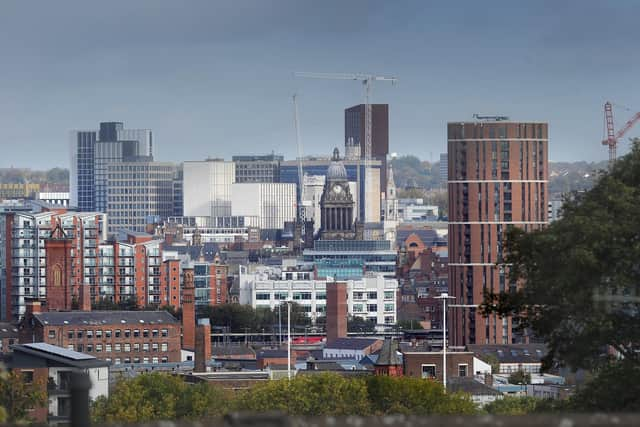Eight years on from George Osborne's Northern Powerhouse speech, bold ideas are needed - Henri Murison
His plan was for “not one city, but a collection of northern cities – sufficiently close to each other that combined they can take on the world”.
The Northern Powerhouse had its roots as an economic project; its political life started slightly later. In 2014, the Cities Growth Commission, led by renowned economist Lord Jim O’Neill, called for better infrastructure alongside more powers and funding for metro areas to unleash their full economic potential.
Advertisement
Hide AdAdvertisement
Hide AdCities are “the most powerful engines of growth almost everywhere”, he said, but in order to drive themselves and their neighbouring areas they needed “more decision-making power to put their best ideas into effect”.


Mr Osborne invited Mr O’Neill to serve as Commercial Secretary to the Treasury and they worked together on a radical plan to fundamentally rebalance the UK economy and transform millions of lives for the better.
Surprisingly, the Labour leadership in Westminster didn’t sufficiently grasp what this might mean and offered no alternative. They failed to recognise the North’s significance, both economically and politically, and it would cost the party greatly.
In June 2017, I walked into the former Chancellor’s office to be interviewed for the post of director of the Northern Powerhouse Partnership, a new privately led consortium of northern business and civic leaders. I had always been a supporter of the Northern Powerhouse, an enthusiastic one at that, but had never met either George or Jim before that day.
Advertisement
Hide AdAdvertisement
Hide AdIt was the eve of the 2017 General Election when Theresa May would manage to almost lose to Jeremy Corbyn, and Mr Osborne was leaving politics. It was a job interview which set me on a course to stand up for a project and idea with far more significance than anything I’d worked on before – to close the North-South divide for good.
Many of the civic leaders involved in the project had been mentors to me during my early days in politics.
I had known Leader of Leeds Council (now Baroness) Judith Blake since joining the Labour Party and as a councillor in Newcastle I’d worked closely with then-Council Leader Nick Forbes.
Both had been on the trade mission to China with northern city leaders in 2015 to bang the drum for the Northern Powerhouse international brand.
Advertisement
Hide AdAdvertisement
Hide AdNone of us were going to let this drop, even in the face of Theresa May’s evident lack of enthusiasm for the project.
My experiences with Conservative Ministers were constructive. Treasury Minister Andrew Jones and the new Northern Powerhouse minister Jake Berry (now Chair of the Northern Research Group) both fought hard to keep the devolution agenda moving. However, I seemed to arrive after much of the party had fizzled out. The devolution deals to Greater Manchester, Liverpool City Region, Tees Valley and South Yorkshire had all been signed. Transport for the North had already been established, with a mandate to write a comprehensive strategy and plan a new line across the Pennines.
Yet, despite Whitehall waxing and waning over the Northern Powerhouse, there was a definite buzz around the first metro mayors when they were elected – and that’s only getting stronger. Labour’s Andy Burnham, Tracy Brabin and Steve Rotheram – the M62 mayors – have now been joined by Oliver Coppard in South Yorkshire. In the Tees Valley, Ben Houchen is making huge strides with his own brand of Conservatism. Their success has been the single greatest achievement of the original Northern Powerhouse vision and, with them, the North has found its voice.
We have got to get back to bold new ideas and ambitious, long-term thinking, as George Osborne himself observed. Levelling up could have promise, and it certainly has strong commitment from Michael Gove and others at the Department for Levelling Up, Housing and Communities.
Advertisement
Hide AdAdvertisement
Hide AdHowever, a weakened Prime Minister is failing to keep the agenda on track. The new high-speed rail line across the Pennines – promised by both Messrs Osborne and Johnson – will no longer reach Leeds. The Eastern leg of HS2 has been cancelled. Opportunity Areas, one of the most effective educational policies of recent years, no longer have local control – the ingredient which proved so crucial to their success. Other than Mr Gove, the cabinet seem reluctant to devolve any real power.
It’s a dangerous time to be breaking promises. Starting in Wakefield, Labour is putting bricks back in the red wall. Sir Keir Starmer and Rachel Reeves have recently committed to devolution in a major way, with a report from Gordon Brown due later this year.
The battleground for the next election is set. History teaches us: ignore the north at your peril. Millions of northern votes are up for grabs – but only the bold will be able to match the boundless ambition of northern business and civic leaders, who have fought for eight years to keep the vision of Northern Powerhouse alive.
- Henri Murison is director of the Northern Powerhouse Partnership.